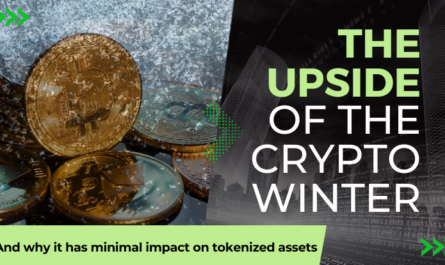
We’re not quite at the end of the year yet, but we’ve already put on our prediction hats and started looking into the future to see what 2020 has in store for the world of real estate and real estate investment. And it’s great news. Because it looks like 2020 is going to be the year when tokenization starts seriously transforming how profits are made in both commercial and residential real estate investment.
Traditional investment models
Right now, if you want to invest in residential real estate, you have two choices: you can buy and manage properties yourself, or you can invest with an organization that assembles a portfolio of properties. Both of these models have flaws.
With the second, the flaws are clear: you need a high degree of trust in the organization you’re investing with, and you have very little control. You hand them your money based on their reputation and advertising. You may or may not have any say in the types of properties they acquire. You’re also relying on their business acumen to manage the properties effectively and find a decent balance of market forces in order to charge a reasonable rent while still providing ongoing dividends for investors.
The first model seems more hands-on, and this is likely what most ordinary investors do: buy one or more apartments or single-family homes and rent them out. Yet this can be a complex process which involves many risks: bad tenants, damage to the property, changes in the local neighborhood. Investors who follow this model must be intimately familiar with the local real estate market and processes so they can make wise decisions about the properties they acquire. Additionally, most investors end up turning over day-to-day management to another company, creating additional expenses.
But today, there’s an alternative: tokenization.
The tokenization model
Tokenization is the evolution of both these models. Tokenization effectively means dividing up a property into many smaller pieces, like shares in a company. Each investor can buy one or more tokens in the property, depending on how much they’d like to invest.
This lets you invest fractionally in a range of projects, guaranteeing that even smaller investors can diversify their portfolio for security and a variety of degrees of risk. Because one group is in charge of development or renovation of a residential property, usually a multifamily property, they are also responsible for either managing the asset or partnering with an asset manager. This removes the day-to-day headaches of property ownership.
Tokenization advantages
A few advantages of tokenization are immediately clear: because it’s based on borderless blockchain technology, investors can choose to invest in any location in the world. And all transactions take place online, meaning they’re carried out much quicker.
Liquidity is much simpler as well – at any point, you can put your tokens up for sale, or swap tokens on an exchange when you decide you’ve held a property for the right amount of time for whatever your level of risk appetite might be.
Because this area is going to be expanding so rapidly over the next couple of years, we’re going to see the rise of property-based businesses, involving property development and management, creating investment opportunities for ordinary investors, just as they’d otherwise invest in stocks or bonds.
Is it secure?
As mentioned, the technology that makes tokenization possible – the reason it’s just starting to blow up now – is blockchain. This is a “distributed ledger” system, a type of database that’s widely and redundantly accessible by all participants. Instead of having a single centralized copy of the registry, as with most exchanges and registries today, there are a vast number of copies – meaning nobody can add information to the ledger or change any data without permission from every single participant.
This system provides both security and transparency. In addition, with smart contracts functionality, blockchain-based transactions can simulate the process of exchanging funds, with money automatically changing hands once a contract’s conditions have been met. This is exactly like a streamlined, automated version of escrow, increasing the level of trust within the system.
The technology can also be extended in a wide range of directions, increasing the flexibility of the investment platform. Over the next few years, we’ll see this expanding to enable additional services for payments, invoicing, rental management and internet of things (IoT) functionality for prediction and identification of any potential problems.
Due diligence
Sure, it’s hard to imagine owning 1/100 of an apartment in Paris or 1/36 of a resort unit in Bali. This model isn’t like a timeshare – you won’t be the one actually living in the space, in the same way that you can own Microsoft stock without actually needing to show up in Redmond and make coffee for CEO Satya Nadella.
And just as with any investment, you definitely still need to make wise investment choices.
Investors are responsible for identifying good projects from the ones available and doing their research, such as reading the private placement memoranda (PPM), consulting with relevant advisors, evaluating the market. But you can rely on the lawyers involved in the PPM as well as the reputation of the token issuers to mitigate other risks.
Great global examples
Here are three great examples of tokenization for residential projects that have us super-excited about the potential of these developments to disrupt the real estate space in 2020:
In part due to lack of regulation, or caution on the part of regulators, different countries around the world are coming on line at different rates. This project – a €2M prime residential property in Wiesbaden – represents an exciting advance into central Europe as well as demonstrating the vast untapped potential for residential tokenization. Investors will enjoy dividends from rent, interest, and principal distributions.
This one is a 12-unit, $30M property in NYC’s fast-rising East Village. According to this article in Forbes magazine, tokenization offers developers a faster, more efficient way of funding the development project without the pressure and rigidity of traditional bank financing. It also offers investors greater flexibility compared to traditional financing models.
This one is exciting because it’s a whole site dedicated to crowdfunded micro-investment (from $100) in top real estate projects, in a range of destinastions all over the world. Investors choose the type of properties they wish to invest in and can build a portfolio of tokenized properties, benefiting from the growing token economy with minimal risk.
These are just a few of the reasons we believe 2020 is going to be the Year of Tokenization. The technology and know-how have come together. And with these three examples we have some awesome groundbreaking projects – along with coverage in major media outlets – all of which has gone a long way to raising public awareness and building trust in this exciting part in the future of real estate investment.
Looking to invest in real estate? Have a property or development project you’re looking to fund? Residential property tokenization could be part of your financial future for 2020! Talk to us to find out whether tokenization might be a good fit for your needs.

 by
by 

